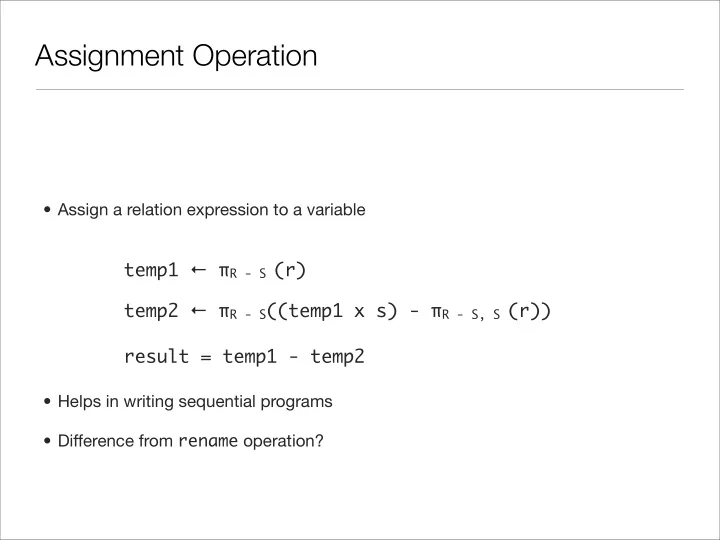

Assignment Operation • Assign a relation expression to a variable temp1 � � R - S (r) temp2 � � R - S ((temp1 x s) - � R - S, S (r)) result = temp1 - temp2 • Helps in writing sequential programs • Difference from rename operation?
Generalized Projection name they_owe i_owe • Use arithmetic functions in projection list Avi 200 150 • � F1, F2, …, Fn (E) Rachel 100 250 • � name, they_owe - I_owe (friends) • � name, (they_owe - I_owe) as actual_money_owed (friends) name actual_money_owed Avi 50 Rachel -150
Aggregate Functions • Input � collection of values, output � single value • sum, avg, count, min, max • Aggregate functions can operate on multisets : multiple occurences of same value
Aggregate Function example emp_name dept_name salary Query: Total salary paid to employees Fraust Resouces 2000 � sum(salary) (employee) Hugo Testing 1300 1200 Rao Development 1200 Vanessa Testing 2000 Query: No. of employees Chen Resouces 1200 � count(emp_name) (employee) Wayne Development 1400 6 employee relation All aggregate functions take a “distinct” variation (since they work on multisets) Query: No. of departments � count-distinct(dept_name) (employee) 3
Grouping with aggregate functions emp_name dept_name salary • If multiple values of an attribute, can group by it Fraust Resouces 2000 Query: Total salary in each department Hugo Testing 1300 Rao Development 1200 More sophisticated. Divide first by groups of department Vanessa Testing 2000 dept_name � sum(salary) (employee) Chen Resouces 1200 dept_name sum(salary) Wayne Development 1400 Resouces 3200 Testing 3300 employee relation Development 2600 Query: Average & maximum salary in each department dept_name � avg(salary) as avg_salary, max(salary) as max_salary (employee) dept_name avg_salary max_salary Resouces 1600 2000 Testing 1650 2000 Development 1300 1400
Outer Join emp_name dept_name salary Fraust Resouces 2000 • Extends natural join Hugo Testing 1300 • Deals with missing information Rao Development 1200 • employee � employee_personal Vanessa Testing 2000 Chen Resouces 1200 • leaves out non-matching tuples Wayne Development 1400 emp_name dept_name salary street city employee relation Fraust Resouces 2000 Mesa Palo Alto Hugo Testing 1300 Walnut North Manchester emp_name street city Rao Development 1200 Main Oakland Fraust Mesa Palo Alto Chen Resouces 1200 Market Carbondale Hugo Walnut North Manchester Wayne Development 1400 Oak Miami Rao Main Oakland Jenna Mesa Palo Alto Chen Market Carbondale • Outer join can make up these Wayne Oak Miami employee_personal relation
Outer Join types • Three types: � , � , � emp_name dept_name salary street city emp_name dept_name salary street city Fraust Resouces 2000 Mesa Palo Alto Fraust Resouces 2000 Mesa Palo Alto Hugo Testing 1300 Walnut North Hugo Testing 1300 Walnut North Manchester Manchester Rao Development 1200 Main Oakland Rao Development 1200 Main Oakland Chen Resouces 1200 Market Carbondale Chen Resouces 1200 Market Carbondale Wayne Development 1400 Oak Miami Wayne Development 1400 Oak Miami Vanessa Testing 2000 null null Jenna null null Mesa Palo Alto employee � employee_personal employee � employee_personal emp_name dept_name salary street city Fraust Resouces 2000 Mesa Palo Alto Hugo Testing 1300 Walnut North Manchester Rao Development 1200 Main Oakland Chen Resouces 1200 Market Carbondale Wayne Development 1400 Oak Miami Jenna null null Mesa Palo Alto Vanessa Testing 2000 null null employee � employee_personal
Null values • “Non-existent” or “unknown” values • Should be avoided if possible • Arithmetic operation with null gives null • Comparison ( � , <, >, � , =, � , …) will give unknown • With booleans (like used in select, which itself is used a lot) • and: (true and unknown) = unknown, (false and unknown) = false, (unknown and unknown) = unknown • or: (true or unknown) = true, (false or unknown) = unknown, (unknown or unknown) = unknown • not: ( not unknown) = unknown
Recommend
More recommend